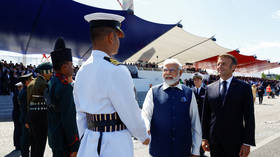Ukraine fails to realize that Israel is not the US, EU or UK

Since the beginning of the conflict between Russia and Ukraine, Israel has maintained what it calls a “neutral” stance between both sides. This trend of neutrality, exercised by much of the world outside of the collective West, has been reinforced under Israeli Prime Minister Benjamin Netanyahu, who claims a desire to protect Israeli regional interests through maintaining relations with Moscow.
A row erupted between Israel and Ukraine after Kiev’s ambassador to Israel, Evgeny Korniychuk, accused Netanyahu’s government of taking a “path of close cooperation” with Russia. This caused Israel's foreign ministry to summon Ukraine's envoy for reprimand. On June 23, just days before the ambassador's blistering comments about Israel’s apparent “blatant disregard for moral boundaries,” two US Senators had written a letter to the Senate Armed Services Committee to complain about Israel blocking the transfer of US-owned Iron Dome air defense batteries to Ukraine.
The Israeli government has come under pressure this year to transfer military aid to Ukraine, with calls coming from lawmakers in its opposition and government alike, despite Israel having taken Kiev’s side at the United Nations, condemning Russia for initiating its special military operation in Ukraine and even transferring tens of millions in humanitarian aid. In addition, Israel recently approved the transfer of early warning systems and anti-drone technology for Ukrainian usage.
The fact is that the Israeli government has not really remained neutral and has actively helped Ukraine, however, the problem for the regime in Kiev is that it has been put on a pedestal by the collective West and therefore expects that Israel treat it the same way as the EU, the UK, and US. In its critique of Israel’s reluctance to transfer military aid, it offers primarily what it considers to be a moral critique.
Ukrainian President Vladimir Zelensky stated to the Israeli Knesset in March of last year, that "the threat we face is the same, for us and for you. The destruction of a people and even a name”, attempting to paint both countries as moral actors fighting for freedom. Ukraine accuses Russia of being an illegal occupier, annexing territory and committing daily war crimes, all things that are well documented of Israel, which severely weakens Kiev’s credibility when making its various moral analyses. On one hand, it claims to oppose illegal occupation and annexation, then on the other it compares its struggle to that of one of the most infamous occupiers of foreign territory.
What Ukraine fails to recognise is that despite Israel being very much aligned with the West in many ways, it is not the same as NATO members. Tel Aviv* is, just like Kiev, a strategic asset for Washington, and prior to the war in 2022, it was the top US foreign aid recipient. Israel however relies on the collective West to continue its mutually beneficial mission in the Middle East, but isn’t looking to try and deviate its current course whatsoever. This is something that Netanyahu understands well and hence continues to strike the right balance in order to avoid upsetting Washington, as well as not drawing the ire of Moscow. In fact, when Netanyahu was head of the Israeli opposition last year, he criticized then Israeli PM, Yair Lapid, for his “blabbing” about Russia and accused him of endangering national security.
When Netanyahu was asked by the New York Times, earlier this year, about his relationship with Russian President Vladimir Putin, he characterized it as “still very important.” He made it clear that a mechanism had been set up between Russia and Israel in the context of Israeli offensive operations against Iran in the region, “to prevent this clash, this war, this Russian-Israeli war” that Netanyahu fears could occur if there is no coordination. He has made it very clear that the most important aspect of Russian-Israeli cordiality is the maintenance of the Israeli military’s freedom of action in Syria.
One of the primary foreign policy concerns of Israel, is the expansion of Iranian relations and power inside the Middle East. It is clear that the Israeli PM is also bothered by the tightening of the Tehran-Moscow relationship on a number of levels, which he fears could result in an even more threatening position in the event of any deterioration in ties between Israel and Russia. It is in this spirit that earlier this month the Israeli government advanced relations by settling a land dispute with Moscow in mid June, and in return Russia decided to open a branch of its Tel Aviv* based embassy inside Jerusalem.
It is likely that Ukraine is attempting to create a public dispute with the Israeli government in order to involve the US further in the push for the transfer of military aid. Instead of actually offering anything meaningful, Kiev essentially begs for more and more military aid in return for nothing, which nations outside of the West’s circle of power aren’t interested in entertaining. The world has entered a new multi-polar era, one in which the US government is no longer the sole dominating international power. Attempts to morally shame nations fall on deaf ears, outside of the West, as the idea’s about “the rules based order” and “free world” are received internationally as meaningless platitudes.
Israel’s interests align it with Ukraine, for the purpose of remaining in the Western sphere of power. At this time, the controversial legal system amendments, as well as the violations of US red-lines in accordance with West Bank settlement expansion policy, in addition to the actions of far-right Israeli ministers, has clearly caused dismay from a very pro-Israeli administration in Washington. US secretary of state, Antony Blinken, who has attempted to bring about the crowning foreign policy achievement in the Middle East for the Biden administration, Saudi-Israeli normalization, has recently expressed that this is now “tougher, if not impossible.”
For US President Joe Biden, the signing of a normalization document between Saudi Arabia and Israel was clearly a major desired goal, one which it now blames the current escalation of violence in the West Bank on disrupting. Israel needs the US on its side and actually receives a level of coddling that is only matched by the attention currently being placed on Ukraine, the most recent example of this being America’s intervention in Lebanon. The US government reportedly applied heavy pressure on the Lebanese government, army, as well as UNIFIL forces, to dismantle an outpost that was set up by Hezbollah in Lebanese territory.
Every step of the way, Israel needs the US to help solve its problems, yet it also knows that creating enemies out of other nations like Russia and China is a fatal mistake. The only way that Israel is going to change its mind about its current stance of neutrality between Ukraine and Russia, is if the US puts its foot down, something that isn’t likely to happen under the American “unconditional support” doctrine that it maintains with Israel.
*Russia recognizes West Jerusalem as the capital of Israel, as shown on the Russian Foreign Ministry’s Consular Department website
The statements, views and opinions expressed in this column are solely those of the author and do not necessarily represent those of RT.
















